Abstract
Improved understanding of how host genetic variation affects resistance to microbial pathogens could lead to better treatment and/or prevention of infectious diseases. The lymphotoxin alpha (LTA)+250 and CD14−159 polymorphisms are associated with differences in susceptibility or outcome to several infections. We stimulated peripheral blood mononuclear cells (PBMC) from 22 healthy individuals with purified lipopolysaccharide (LPS), heat-killed Escherichia coli or Streptococcus pneumoniae. TNFαintracellular protein levels were measured by flow cytometry and mRNA was quantitated by RT-PCR. TNFα mRNA levels were higher in LTA+250GG subjects after 4 h incubation with LPS compared with LTA+250AA (T test, P=0.001). In contrast, after 8 h incubation with S. pneumoniae, there was slightly more TNFα mRNA in cells from LTA+250AA subjects. After 4 h incubation with LPS or E. coli, CD14−159TT subjects had higher TNFα mRNA levels than CD14−159CC (P=0.05, 0.033, respectively). Neither polymorphism affected the proportion of cells expressing intracellular TNFα protein. This suggests that the polymorphisms affected transcription and that other regulatory mechanisms affect production of TNFα protein. The effect of these two polymorphisms on TNFα mRNA production is stimulus dependent, with opposite effects observed for Gram-positive and Gram-negative stimuli.
This is a preview of subscription content, access via your institution
Access options
Subscribe to this journal
Receive 6 digital issues and online access to articles
$119.00 per year
only $19.83 per issue
Buy this article
- Purchase on Springer Link
- Instant access to full article PDF
Prices may be subject to local taxes which are calculated during checkout




Similar content being viewed by others
References
Sorensen TI, Nielsen GG, Andersen PK, Teasdale TW . Genetic and environmental influences on premature death in adult adoptees. N Engl J Med 1988; 318: 727–732.
Majetschak M, Flohe S, Obertacke U et al. Relation of a TNF gene polymorphism to severe sepsis in trauma patients. Ann Surg 1999; 230: 207–214.
Waterer GW, Quasney MW, Cantor RM, Wunderink RG . Septic shock and respiratory failure in community-acquired pneumonia have different TNF polymorphism associations. Am J Respir Crit Care Med 2001; 163: 1599–1604.
Stuber F, Petersen M, Bokelmann F, Schade U . A genomic polymorphism within the tumor necrosis factor locus influences plasma tumor necrosis factor-alpha concentrations and outcome of patients with severe sepsis. Crit Care Med 1996; 24: 381–384.
Calandra T . Pathogenesis of septic shock: implications for prevention and treatment. J Chemother 2001; 13 Spec No 1: 173–180.
Bouma G, Crusius JB, Oudkerk PM et al. Secretion of tumour necrosis factor alpha and lymphotoxin alpha in relation to polymorphisms in the TNF genes and HLA-DR alleles. Relevance for inflammatory bowel disease. Scand J Immunol 1996; 43: 456–463.
Messer G, Spengler U, Jung MC et al. Polymorphic structure of the tumor necrosis factor (TNF) locus: an NcoI polymorphism in the first intron of the human TNF-beta gene correlates with a variant amino acid in position 26 and a reduced level of TNF-beta production. J Exp Med 1991; 173: 209–219.
Beraun Y, Nieto A, Collado MD, Gonzalez A, Martin J . Polymorphisms at tumor necrosis factor (TNF) loci are not associated with Chagas' disease. Tissue Antigens 1998; 52: 81–83.
Rosen HR, McHutchison JG, Conrad AJ et al. Tumor necrosis factor genetic polymorphisms and response to antiviral therapy in patients with chronic hepatitis C. Am J Gastroenterol 2002; 97: 714–720.
Nuntayanuwat S, Dharakul T, Chaowagul W, Songsivilai S . Polymorphism in the promoter region of tumor necrosis factor-alpha gene is associated with severe meliodosis. Hum Immunol 1999; 60: 979–983.
Wattavidanage J, Carter R, Perera KL et al. TNFalpha*2 marks high risk of severe disease during Plasmodium falciparum malaria and other infections in Sri Lankans. Clin Exp Immunol 1999; 115: 350–355.
Aderem A, Ulevitch RJ . Toll-like receptors in the induction of the innate immune response. Nature 2000; 406: 782–787.
Baldini M, Lohman IC, Halonen M, Erickson RP, Holt PG, Martinez FD . A Polymorphism* in the 5′ flanking region of the CD14 gene is associated with circulating soluble CD14 levels and with total serum immunoglobulin E. Am J Respir Cell Mol Biol 1999; 20: 976–983.
Gibot S, Cariou A, Drouet L, Rossignol M, Ripoll L . Association between a genomic polymorphism within the CD14 locus and septic shock susceptibility and mortality rate. Crit Care Med 2002; 30: 969–973.
Hubacek JA, Stuber F, Frohlich D et al. The common functional C(-159)T polymorphism within the promoter region of the lipopolysaccharide receptor CD14 is not associated with sepsis development or mortality. Genes Immun 2000; 1: 405–407.
Koss K, Satsangi J, Fanning GC, Welsh KI, Jewell DP . Cytokine (TNF alpha, LT alpha and IL-10) polymorphisms in inflammatory bowel diseases and normal controls: differential effects on production and allele frequencies. Genes Immun 2000; 1: 185–190.
Pociot F, Briant L, Jongeneel CV et al. Association of tumor necrosis factor (TNF) and class II major histocompatibility complex alleles with the secretion of TNF-alpha and TNF-beta by human mononuclear cells: a possible link to insulin- dependent diabetes mellitus. Eur J Immunol 1993; 23: 224–231.
LeVan TD, Bloom JW, Bailey TJ et al. A common single nucleotide polymorphism in the CD14 promoter decreases the affinity of Sp protein binding and enhances transcriptional activity. J Immunol 2001; 167: 5838–5844.
Haziot A, Ferrero E, Kontgen F et al. Resistance to endotoxin shock and reduced dissemination of Gram-negative bacteria in CD14-deficient mice. Immunity 1996; 4: 407–414.
van Furth AM, Verhard-Seijmonsbergen EM, Langermans JA, van Dissel JT, van Furth R . Anti-CD14 monoclonal antibodies inhibit the production of tumor necrosis factor alpha and interleukin-10 by human monocytes stimulated with killed and live Haemophilus influenzae or Streptococcus pneumoniae organisms. Infect Immun 1999; 67: 3714–3718.
Louis E, Franchimont D, Piron A et al. Tumour necrosis factor (TNF) gene polymorphism influences TNF-alpha production in lipopolysaccharide (LPS)-stimulated whole blood cell culture in healthy humans. Clin Exp Immunol 1998; 113: 401–406.
Arva E, Andersson B . Kinetics of cytokine release and expression of lymphocyte cell-surface activation markers after in vitro stimulation of human peripheral blood mononuclear cells with Streptococcus pneumoniae. Scand J Immunol 1999; 49: 237–243.
Purswani M, Eckert S, Arora H, Johann-Liang R, Noel GJ . The effect of three broad-spectrum antimicrobials on mononuclear cell responses to encapsulated bacteria: evidence for down-regulation of cytokine mRNA transcription by trovafloxacin. J Antimicrob Chemother 2000; 46: 921–929.
Hessle C, Hanson LA, Wold AE . Interleukin-10 produced by the innate immune system masks in vitro evidence of acquired T-cell immunity to E. coli. Scand J Immunol 2000; 52: 13–20.
Vogel SN, Perera PY, Detore G et al. CD14 dependent and independent signaling pathways in murine macrophages from normal and CD14 ‘knockout’ (CD14KO) mice stimulated with LPS or taxol. Prog Clin Biol Res 1998; 397: 137–146.
Acknowledgements
We thank John Boehm from the Department of Microbiology, Royal Perth Hospital, for advice and assistance with the culturing of the bacteria, and Rom Krueger from the Department of Haematology, Royal Perth Hospital, for expert assistance with flow cytometry.
Author information
Authors and Affiliations
Corresponding author
Additional information
This work was funded by Genomics Collaborative Inc. (America) and the Raine Medical Research Foundation of Western Australia.
Rights and permissions
About this article
Cite this article
Temple, S., Cheong, K., Almeida, C. et al. Polymorphisms in lymphotoxin alpha and CD14 genes influence TNFα production induced by Gram-positive and Gram-negative bacteria. Genes Immun 4, 283–288 (2003). https://doi.org/10.1038/sj.gene.6363963
Published:
Issue Date:
DOI: https://doi.org/10.1038/sj.gene.6363963
Keywords
This article is cited by
-
The neck-region polymorphism of DC-SIGNR in peri-centenarian from Han Chinese Population
BMC Medical Genetics (2009)
-
A CD14 promoter polymorphism is associated with CD14 expression and Chlamydia-stimulated TNFα production
Genes & Immunity (2004)



